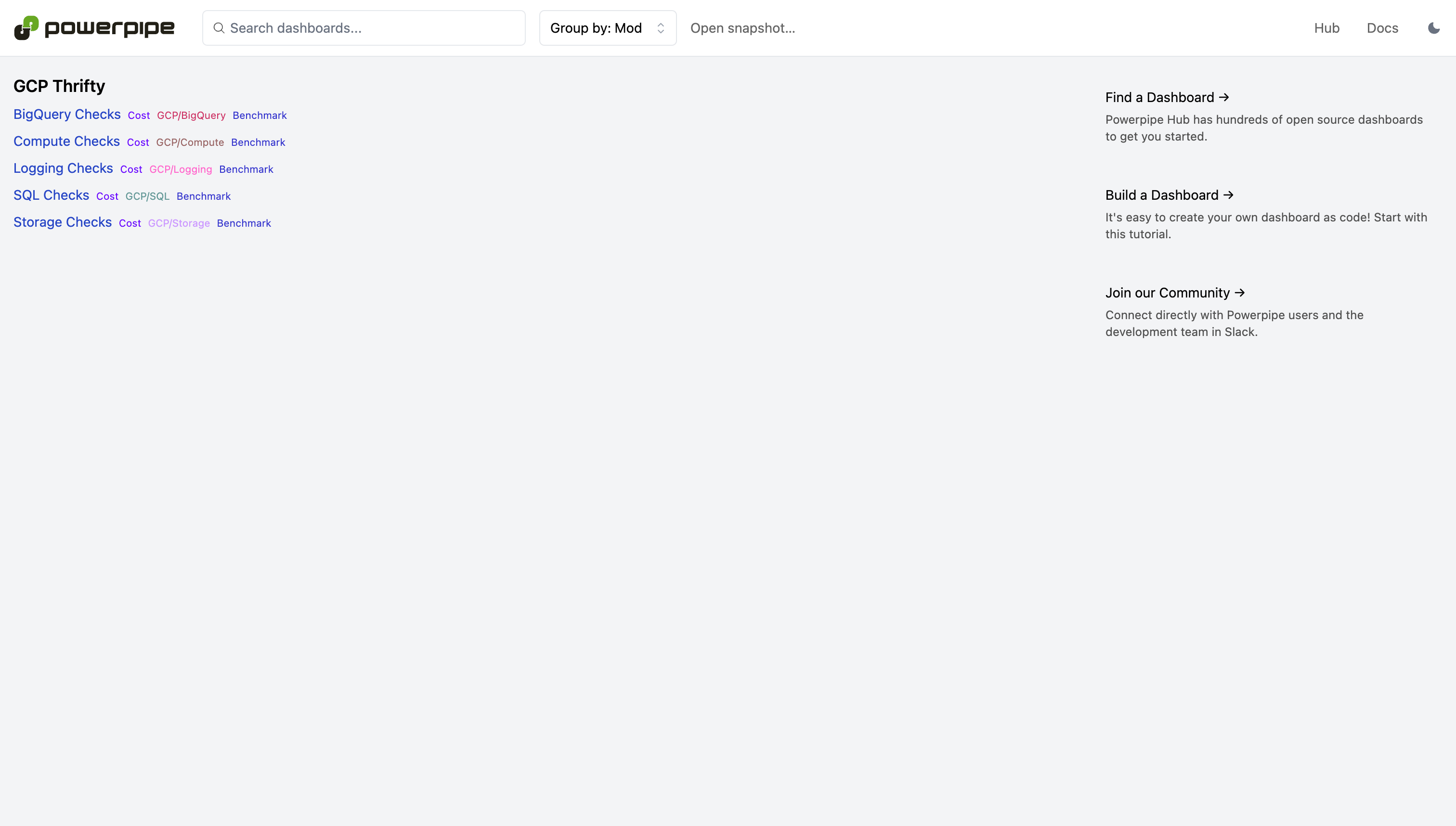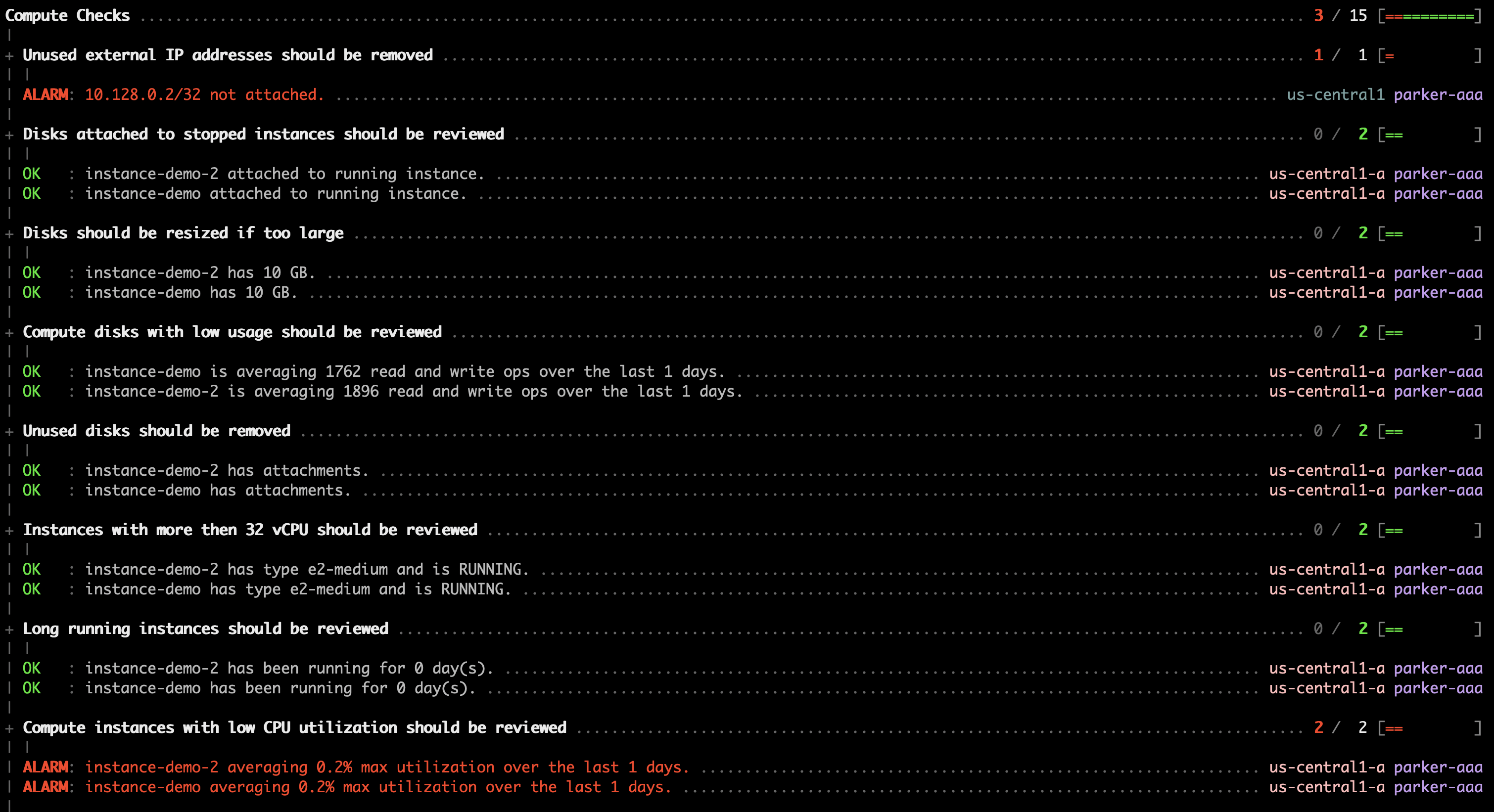A GCP cost savings and waste checking tool.
Run checks in a dashboard:
Or in a terminal:
Includes checks for:
- Unused, underused and oversized Compute Instances
- Unused, underused and oversized Compute Disks and Snapshots
- Unattached Compute External IPs
- Stale BigQuery Tables
- Storage Buckets without lifecycle policies
- #TODO List
Install Powerpipe (https://powerpipe.io/downloads), or use Brew:
brew install turbot/tap/powerpipeThis mod also requires Steampipe with the GCP plugin as the data source. Install Steampipe (https://steampipe.io/downloads), or use Brew:
brew install turbot/tap/steampipe
steampipe plugin install gcpSteampipe will automatically use your default GCP credentials. Optionally, you can setup multiple projects.
Finally, install the mod:
mkdir dashboards
cd dashboards
powerpipe mod init
powerpipe mod install github.com/turbot/steampipe-mod-gcp-thriftyStart Steampipe as the data source:
steampipe service startStart the dashboard server:
powerpipe serverBrowse and view your dashboards at http://localhost:9033.
Instead of running benchmarks in a dashboard, you can also run them within your
terminal with the powerpipe benchmark command:
List available benchmarks:
powerpipe benchmark listRun a benchmark:
powerpipe benchmark run gcp_thrifty.benchmark.computeDifferent output formats are also available, for more information please see Output Formats.
Several benchmarks have input variables that can be configured to better match your environment and requirements. Each variable has a default defined in its source file, e.g., controls/sql.sp, but these can be overwritten in several ways:
It's easiest to setup your vars file, starting with the sample:
cp powerpipe.ppvars.example powerpipe.ppvars
vi powerpipe.ppvarsAlternatively you can pass variables on the command line:
powerpipe benchmark run gcp_thrifty.benchmark.bigquery --var=bigquery_table_stale_data_max_days=90Or through environment variables:
export PP_VAR_bigquery_table_stale_data_max_days=90
powerpipe benchmark run gcp_thrifty.benchmark.bigqueryThese are only some of the ways you can set variables. For a full list, please see Passing Input Variables.
The benchmark queries use common properties (like connection_name, location and project) and tags that are defined in the form of a default list of strings in the variables.sp file. These properties can be overwritten in several ways:
It's easiest to setup your vars file, starting with the sample:
cp powerpipe.ppvars.example powerpipe.ppvars
vi powerpipe.ppvarsAlternatively you can pass variables on the command line:
powerpipe benchmark run gcp_thrifty.benchmark.compute --var 'tag_dimensions=["environment", "owner"]'Or through environment variables:
export PP_VAR_common_dimensions='["connection_name", "location", "project"]'
export PP_VAR_tag_dimensions='["environment", "owner"]'
powerpipe benchmark run gcp_thrifty.benchmark.computeThis repository is published under the Apache 2.0 license. Please see our code of conduct. We look forward to collaborating with you!
Steampipe and Powerpipe are products produced from this open source software, exclusively by Turbot HQ, Inc. They are distributed under our commercial terms. Others are allowed to make their own distribution of the software, but cannot use any of the Turbot trademarks, cloud services, etc. You can learn more in our Open Source FAQ.
Want to help but don't know where to start? Pick up one of the help wanted issues:

